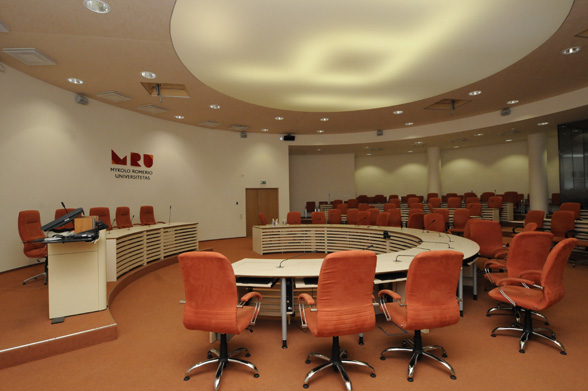
March 31st, 2020, the Council of Mykolas Romeris University unanimously approved MRU Rector Prof. Inga Žalėnienė’s 2019 annual report that was presented remotely to members of the University academic community. Rector Žalėnienė began her term last March. She became the first woman in Lithuania to head a state university.
Mykolas Romeris University remains the largest social sciences university in Lithuania. The University is most distinguished in the areas of: law, public security and public management. It remains strong in economics, educational sciences, humanities, social work, communication, political science, psychology and management. University studies strategic priorities remain actualization of studies content in order to prepare professionals to face future challenges and internationalization.
In 2019, there were 29 studies programmes implemented in the I cycle, 51 studies programmes in the II cycle, and 1 professional studies programme. In 2019, MRU began to implement LLM studies offering three new areas in Law II cycle studies programmes: Mediation LLM, Health Law LLM, and the Law and Technologies LLM. Also, MRU remains a leader among Lithuania’s largest universities, according to the number of studies programmes offered in English. The University in 2019 implemented 17 studies programmes in English: 7 of which were joint, 1 double diploma and 9 national.
In the global ‘’QS World University Rankings by Subject,’’ Mykolas Romeris University was ranked among the 300 best universities of the world in law and ranked between the 251-300th position. Mykolas Romeris University was the only Lithuanian university that was evaluated and made the list of 300 best universities for law.
In 2019, MRU researchers actively participated in national and international projects (over 50 implemented projects). The number of international projects implemented has remained stable and each year about 30 such projects are implemented. University academics successfully integrated into international professional networks, research journal editorial boards, and as experts in national and international research programmes.
Regarding research, the number of MRU research publications was on the rise. In 2019 the number of MRU publications in the “Clarivate’ Analytics Web of Science database increased 15% and in the “Scopus” database 12%. MRU researchers’ citation levels also increased. During 2017-2019, in the Clarivate Analytics Web of Science database’s existing publications citations grew by 17,6% and in the Scopus databases citations grew by 25,6%.
Studies Qualities, Internationalization, the Social Mission – Priorities Among Strategic Activities
Development of studies at the University is related to long-term Lithuanian societal and labour market needs. The aim is to have studies oriented towards the student’s personal success and development of civic-mindedness linked with technological progress and offering international mobility opportunities. In addition, it is sought to integrate international lecturers of the highest level along with joint studies with students from across the globe.
The number of students and auditors at the University remained stable. In 2019 during the general admission, there were 26%.more students admitted who had received a state-financed studies place compared with 2018. In addition, the number of students admitted from abroad compared to 2018 grew by 93% in Bachelor’s Degree studies and by 22% in Master’s Degree studies.
The University is actively developing the “Lifelong Learning” concept. Various types of studies are offered for different types of groups. Qualification and professional training services are also offered. A wide array of foreign languages are taught. MRU seeks to offer flexible studies forms for diverse economic and geographical groups, those who are combining studies with work and for senior citizens. There is an effort to better understand and to respond to the needs of students with disabilities and to offer a more suitable learning environment for this segment of students.